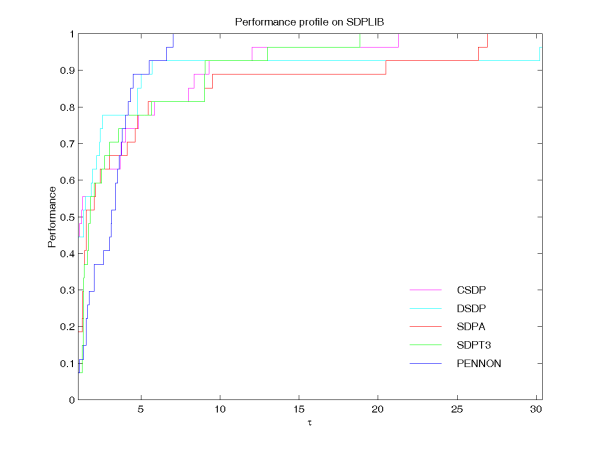Results of SDPLIB problems
For the description and problem data, see SDPLIB.
Selected SDPLIB problems
|
no._of |
size_of |
|
no._of |
size_of |
| problem |
var. |
matrix |
problem |
var. |
matrix |
| arch8 |
174 |
335 |
qap9 |
748 |
82 |
| control7 |
136 |
45 |
qap10 |
1021 |
101 |
| control10 |
1326 |
150 |
qpG11 |
800 |
1600 |
| control11 |
1596 |
165 |
qpG51 |
1000 |
2000 |
| equalG11 |
801 |
801 |
ss30 |
132 |
426 |
| equalG51 |
1001 |
1001 |
theta3 |
1106 |
150 |
| gpp250-4 |
250 |
250 |
theta4 |
1949 |
200 |
| gpp500-4 |
501 |
500 |
theta5 |
3028 |
250 |
| hinf15 |
91 |
37 |
theta6 |
4375 |
300 |
| maxG11 |
800 |
800 |
thetaG11 |
2401 |
801 |
| maxG32 |
2000 |
2000 |
thetaG51 |
6910 |
1001 |
| maxG51 |
1001 |
1001 |
truss7 |
86 |
301 |
| mcp250-1 |
250 |
250 |
truss8 |
496 |
628 |
| mcp500-1 |
500 |
500 |
|
|
|
Results
| problem |
CSDP |
DSDP |
SDPA |
SDPT3 |
SeDuMi |
PENNON |
| arch8 |
10 |
4 |
5 |
7 |
33 |
6 |
| control7 |
53 |
114 |
61 |
48 |
47 |
82 |
| control10 |
155 |
740 |
329 |
194 |
27 |
669 |
| control11 |
218 |
1236 |
519 |
288 |
490 |
974 |
| equalG11 |
121 |
139 |
94 |
156 |
1260 |
102 |
| equalG51 |
320 |
351 |
261 |
350 |
3678 |
391 |
| gpp250-4 |
11 |
4 |
3 |
8 |
56 |
4 |
| gpp500-4 |
36 |
3 |
27 |
39 |
379 |
21 |
| hinf15 |
1 |
1 |
1 |
3 |
2 |
1 |
| maxG11 |
50 |
6 |
123 |
54 |
887 |
25 |
| maxG32 |
669 |
72 |
1937 |
650 |
15084 |
259 |
| maxG51 |
152 |
26 |
124 |
147 |
2081 |
172 |
| mcp250-1 |
4 |
1 |
3 |
4 |
20 |
2 |
| mcp500-1 |
16 |
2 |
19 |
18 |
239 |
7 |
| qap9 |
2 |
10 |
3 |
5 |
19 |
11 |
| qap10 |
4 |
19 |
6 |
8 |
44 |
16 |
| qpG11 |
383 |
18 |
474 |
339 |
6878 |
68 |
| qpG51 |
693 |
185 |
1003 |
658 |
22226 |
294 |
| ss30 |
20 |
10 |
41 |
18 |
99 |
20 |
| theta3 |
6 |
11 |
8 |
10 |
35 |
18 |
| theta4 |
25 |
48 |
35 |
34 |
172 |
84 |
| theta5 |
79 |
172 |
110 |
110 |
605 |
267 |
| theta6 |
215 |
551 |
276 |
287 |
2282 |
797 |
| thetaG11 |
127 |
3841 |
190 |
168 |
1422 |
394 |
| thetaG51 |
14642 |
>20000 |
3041 |
3770 |
13679 |
9475 |
| truss7 |
1 |
1 |
2 |
1 |
1 |
1 |
| truss8 |
5 |
12 |
23 |
8 |
6 |
13 |
Test performed on Pentium IV PC (2.5 GHz) with 2GB RDRAM running
Linux-2.4.19.
CPU in seconds.
To see a kind of average behaviour, in the next table we show the sum
of CPU times for two sets of problems (``non-G'' and ``G''), as well as for
all problems from the above table.
problem
|
CSDP
|
DSDP
|
SDPA
|
SDPT3
|
SeDuMi
|
PENNON
|
| non-G |
861 |
2936 |
1471 |
1090 |
4803 |
2993 |
| G \ thetaG51 |
2515 |
4638 |
4206 |
2522 |
53516 |
1405 |
| all |
18018 |
>27574 |
8718 |
7382 |
71998 |
13873 |
Finally we present the performance profile of the
codes on this problem collection. It shows that PENNON is not often among
the fastest performers (on this set) but is indeed the most robust and efficient
one.

Michal
Kocvara
June 27, 2003
